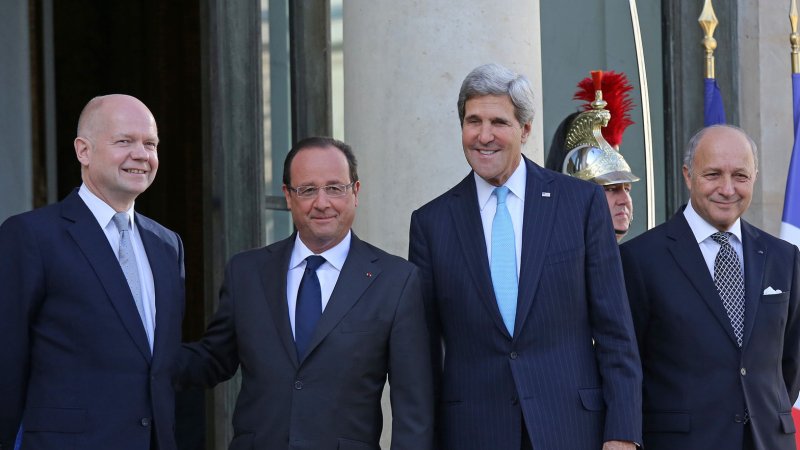(From L to R) British Foreign Secretary William Hague, French President Francois Hollande, U.S. Secretary of State John Kerry and French Foreign Minister Laurent Fabius arrive for a meeting on the Syria conflict at the Elysee Palace in Paris on September 16, 2013. UPI/David Silpa |
License Photo
UNITED NATIONS, Sept. 16 (UPI) -- A U.N. team of scientists said Monday it has found "clear and convincing evidence" of chemical weapons use in Syria.
The team, led by Swedish scientist Ake Sellstrom, who specializes in disarmament and chemical weapons issues, said their investigation shows sarin gas was used in an attack Aug. 21 in the Ghouta area on the outskirts of Damascus, the United Nations said Monday.
The report, delivered Sunday to U.N. Secretary-General Ban Ki-moon, said it is the conclusion of the U.N. mission that "chemical weapons have been used in the ongoing conflict between the parties in [Syria], also against civilians, including children, on a relatively large scale."
"In particular, the environmental, chemical and medical samples collected during the mission provide clear and convincing evidence that surface-to-air-rockets containing the nerve agent sarin were used in the Ghouta area of Damascus," the U.N. report said.
The Obama administration has said 1,429 were killed in the attack, including more than 400 children. It alleges the Assad regime was responsible.
Russia, Syria's No. 1 ally, disagrees, suggesting Syrian opposition rebels may have killed the civilians with the nerve gas to gain Western allied support.
"The United Nations Mission has now confirmed, unequivocally and objectively, that chemical weapons have been used in Syria," Ban said in a statement. "The international community has a responsibility to hold the perpetrators accountable and to ensure that chemical weapons never re-emerge as an instrument of warfare."
The U.N. inspectors mandate was to determine whether chemical weapons were used in the attack, but not to say who is to blame.
U.S. lawmakers during the weekend voiced guarded hope about the U.S.-Russian deal to destroy Syria's nerve gas.
"It's hard for anybody to pooh-pooh the idea that we may be on the way to a diplomatic solution," Sen. Bob Corker of Tennessee, the top Republican on the Senate Foreign Relations Committee, told The New York Times.
At the same time, "we should be skeptical" until a U.N. resolution is worked out, Corker told CBS' "Face the Nation."
Sen. Ron Johnson, R-Wis., told the Times he thinks Washington has an opportunity to "parlay" the chemical weapons talks into negotiations to end Syria's civil war and remove President Bashar Assad from power.
"If the framework can actually be implemented, obviously it will be a big step in the right direction," Johnson said, adding he hoped the outlined deal with which Syria said it would comply succeeds.
"I truly do," he told the newspaper. "If [President Obama] succeeds with this framework, people have to give him credit."
Sen. Robert Menendez, D-N.J., told NBC's "Meet the Press" the deal to bring Syria's chemical weapons under international control was "a diplomatic breakthrough that is full of opportunity and fraught with danger."
Among the risks, he said, is the likelihood Moscow would find plausible reasons to prevent the U.N. Security Council from taking any enforceable action if Assad didn't fulfill elements of the deal.
"Look, we're not there yet," Obama said on ABC's "This Week." "We don't have an actual, verifiable deal that will begin that process. But the distance that we've traveled over these couple of weeks is remarkable."
He said as a result of "steps that we've taken over the last two weeks to three weeks, we now have a situation in which Syria has acknowledged it has chemical weapons, has said it's willing to join the convention on chemical weapons, and Russia, its primary sponsor, has said that it will pressure Syria to reach that agreement."
"That's my goal. And if that goal is achieved, then it sounds to me like we did something right," he said.















